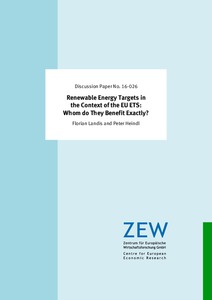Renewable energy targets in the context of the EU ETS: whom do they benefit exactly?

Landis, Florian ; Heindl, Peter
Zentrum für Europäische Wirtschaftsforschung, Mannheim
ZEW - Mannheim
2016
48 p.
climate change ; energy policy ; EU policy ; renewable resources
Discussion Paper
16-026
Energy
English
Bibliogr.
"We study how European climate and energy policy targets affect different member states and households of different income quintiles within the member states. We find that renewable energy targets in power generation, by reducing EU ETS permit prices, may make net permit exporters worse off and net permit importers better off. This effect appears to dominate the effciency cost of increasing the share of energy provided by renewable energy sources in the countries that adopt such targets. While an increase in prices for energy commodities, which is entailed by the policies in question, affects households in low income quintiles the most, recycling revenues from climate policy allows governments to compensate them for the losses. If renewable targets reduce the revenues from ets permit auctions, member states with large allocations of auctionable permits will lose some of the ability to do so."
Digital
The ETUI is co-funded by the European Union. Views and opinions expressed are however those of the author(s) only and do not necessarily reflect those of the European Union or the ETUI.